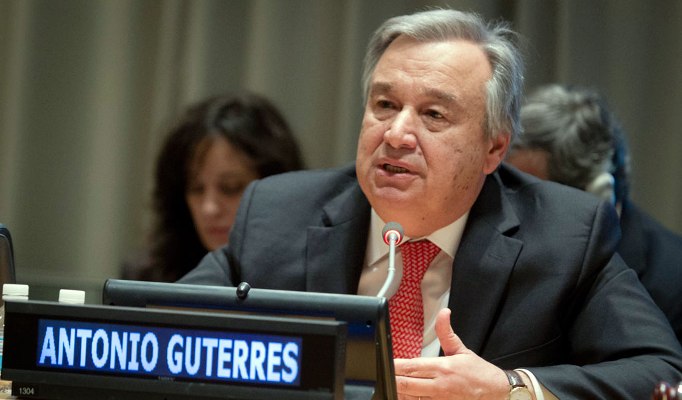President Kiir says ready for positive working relations with new UN chief

January 6, 2017 (JUBA) – South Sudan President Salva Kiir expressed readiness and optimism of forging new working relations with the new Secretary General of the United Nations, António Guterres, saying his administration appreciate and wants to enhance better working relations with the new leadership
“Sometimes situation creates misunderstanding, it creates confusion but with leadership, these challenges can be turned into opportunity to address the issues of concern. I extend you, your Excellency, on behalf of the people of South Sudan and the government the support your office would require so that we all work together in championing universal principles and ideals enshrined in the UN charter”, president Kiir said in a congratulatory message address to the new Secretary-General of the United Nations, António Guterres, who assumed office this week.
Kiir said he would like the United Nations and other western countries to look at South Sudan as a member state with equal rights, sovereignty and leadership ready to work with the global community.
He said sanctions and arms embargo would not solve the problem but rather support for peaceful dialogue and nonpartisan engagement of the international community would address the conflict.
“We say sanctions and arms embargo would not contribute to addressing the issues of war, instead they will exacerbate and undermine the process”, he added in a 1st January 2017 message seen by Sudan Tribune on Friday.
The message is his first official reaction to a draft resolution by the United States, backed by Britain and France, seeking to impose arms embargo after it warned of a risk of impending mass atrocities and genocide.
The measure, however, fell short of the nine votes needed for adoption in the 15-member council.
Russia, China, Japan, Malaysia, Venezuela and three African council members — Angola, Egypt and Senegal, abstained from the voted after they all expressed serious reservations.
Activists and human right groups viewed the rejection of the arms embargo a setback for the United States, which helped South Sudan to gain independence in 2011 but has been unable to steer the country away from a war that erupted two years later.
If the proposal was approved it would have seen rebel leader Riek Machar, Chief of General Staff of the government forces and a key ally of President Kiir, Paul Malong and Information Minister Michael Makuei, put on a sanctions blacklist and subjected to an assets freeze and a global travel ban.
Japan, which has some 350 troops serving in the UN mission in South Sudan, has argued that the measures, if adopted, would antagonize President Kiir’s government and put peacekeepers’ lives at risk.
Opponents of the sanctions point to Kiir’s call earlier this month for a national dialogue process to restore peace, saying that initiative must be given a chance.
However, the former UN Secretary General Ban Ki-moon was backing the U.S. push for sanctions on South Sudan, saying an embargo would reduce the capacity of all sides to wage war.
“If we fail to act, South Sudan will be on a trajectory towards mass atrocities,” Ban told the Council. The proposal provides for a one-year ban on the “supply, sale or transfer” of “arms and related materiel of all types, including weapons and ammunition, military vehicles and equipment” as well as spares parts.
The world’s youngest nation, South Sudan descended into war in December 2013, leaving tens of thousands dead and more than 3.1 million people displaced.
U.S. Ambassador Samantha Power argued at the time of failing to secure the support of other members that all sides were mobilizing for more fighting and that action was needed to prevent a bloodbath.
“The situation is not getting better, but worse, and we are sitting on our hands,” Power told the council on Monday. “Large-scale attacks could start at any moment.”
Russian Deputy Ambassador Petr Iliichev expressed different view of the warning and cast doubt over warnings of a risk of genocide, arguing that criminal groups and “undisciplined” troops were responsible for mass violence, and not the government’s policy.
There is growing alarm over the humanitarian crisis in the country as the conflict enters its fourth year.
More than 6 million people — half of South Sudan’s population — are in need of urgent aid and humanitarian organizations expect this number to rise by 20 to 30 percent next year.
Some 1.3 million South Sudanese have fled across borders as refugees, including 383,000 who have fled to Uganda since July, according to UN figures.
(ST)
